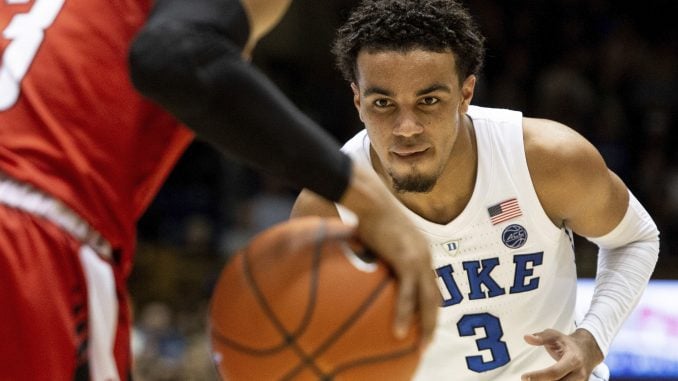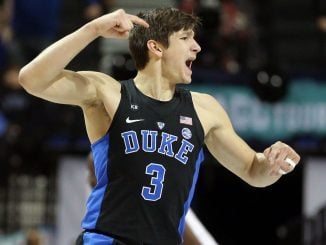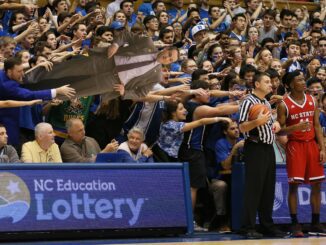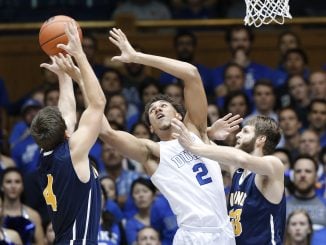
DURHAM — Late in Duke’s home win over Yale, freshman point guard Tre Jones limped off the floor. After getting attention from the medical staff on the bench, he checked back into the game, only to limp off again after one play. He headed into the locker room with a trainer in tow to get checked out, but his night was done.
“He banged knees,” coach Mike Krzyzewski said. “When he went in the next time, he still hadn’t gotten over it, and when he got to the bench he said, ‘I can still go in.’ I told him to just forget it.”
Jones’ shaky health seems to be something Krzyzewski has resigned himself to this season.
“He’ll be fine,” the coach said. “He’s just going to be somebody that has to recover after every game, because he plays so darn hard.”
Case in point: Jones’ knee bruise came when he dove on the floor for a loose ball, easily the sixth time in the game the freshman point guard had done so. While slapping the floor to prepare for a defensive stand has long been a tradition at Duke, this year’s team, led by Jones, is doing so with their bodies, not their palms.
Zion Williamson, the team’s 285-pound future NBA draft pick, has also made a habit of throwing himself to the floor to corral loose balls. The effort has produced a suffocating pressure defense not seen in Durham since the heyday of the early 1990s.
The effort and production on the defensive end are a surprise from a freshman-laden team, especially in light of last year’s team, also led by future one-and-done NBA prospects who so often appeared lost on defense that Krzyzewski had to resort to a zone for much of the season.
This year, the only zone has been one marked “danger” for opposing ballhandlers. Jones’ primary job is to disrupt the other team’s offense by harassing its point guard into submission.
Veteran Yale point Alex Copeland, who had five turnovers on the night and only one assist, was the latest victim.
“It all starts with his pressure on the ball,” Krzyzewski said. “Copeland is a really good guard, but he had to fight Tre the whole night.”
“He does that every game,” RJ Barrett said. “He takes the point guard out every game.”
With the point guard neutralized, everything becomes harder for the opposing offense, which has been taken out of its rhythm.
“Our ball pressure, picking them up early, just pushes them out a little bit further from where they normally start their offense,” Krzyzewski said. “It gave us a chance to deny and switch, and not get hurt that much by it. Also, with any dribble moves, there’s at least one extra dribble that they have to take. Our guys are learning this kind of stuff.”
They’re also learning what to do next when an opponent starts to get off kilter on offense. The opposing team needs to try to make something happen on the fly, which leaves it vulnerable to ball-hawking wings like Barrett and Williamson, who are able to turn a loose ball into a transition dunk in a blink of an eye.
Duke has already scored 283 points in transition this season, averaging 1.31 points per fast break. Both figures lead the nation by a large margin. The Blue Devils average 11.1 steals a game, a 49 percent increase over last year and on pace to shatter the school record, set by the 2001 national champions.
Duke is also forcing 16.7 turnovers a game, which is 36 percent more than last year and the most by a Duke team since the back-to-back national champions of 1991 and 1992.
It all starts with Jones at the point, grinding down his counterpart with the ball.
“That makes it easier for all of our other guys to play defense,” Krzyzewski said. “If we become the team that we’re going to be defensively, Tre will be as valuable a defender as there is in the country, because of what he does. Similar to when Wojo [Steve Wojciechowski] got Defensive Player of the Year, or Tommy Amaker. (They) recognize the value of pressure and how we’re trying to put our team together.”
When Duke does it well, playing defense that way looks easy, as if the opposing team just doesn’t know what to do with the ball. It’s the end product of effort and energy, however, and it requires buy-in from everyone on the floor.
“It’s not just on Tre. It’s on everybody to pick up the defense,” Krzyzewski said. “If we’re not hitting, then we need to let the defense stir it up and give you energy. If we become the team that I hope we become, it’ll be because of the energy we have on defense that will lead to offense.”
It will also lead to one battered and bruised point guard, but no one seems hesitant to pay that price.



